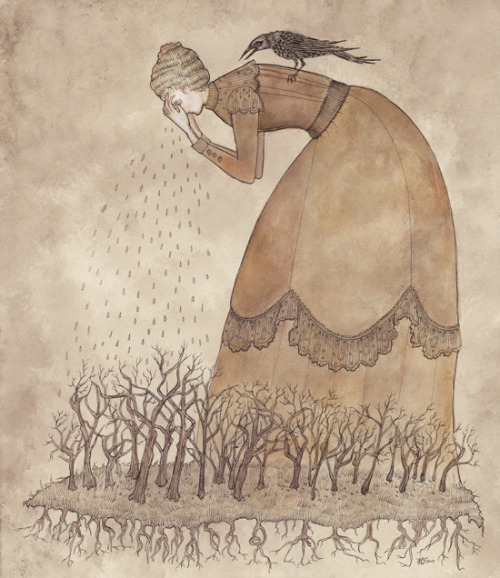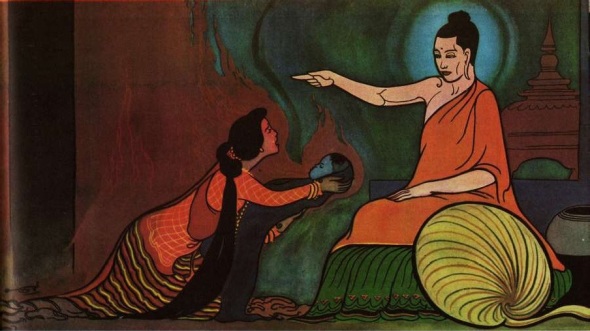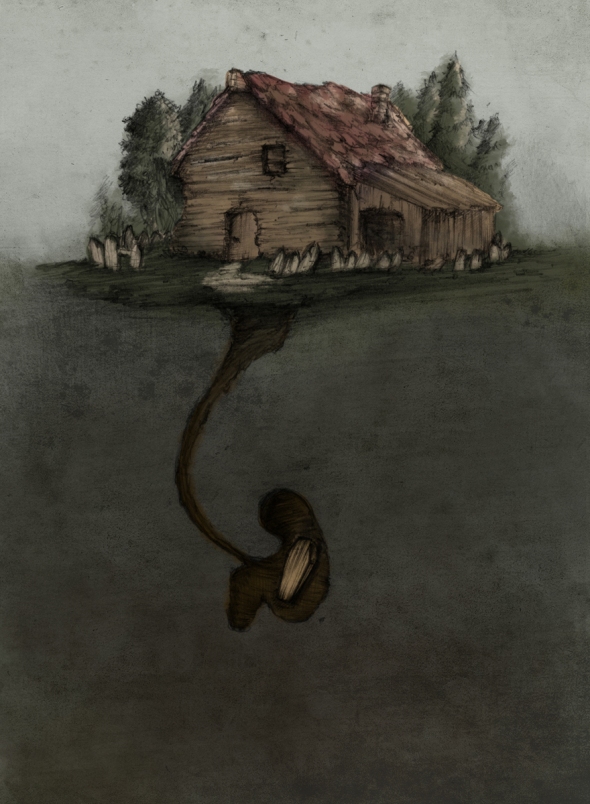5 Folktales About Grief
18September 6, 2015 by Paula Reed Nancarrow

Weeping Woods by Kelly Louise Judd. Used with permission.
“There is probably more folklore emanating from mortals’ response to dying and death than any other human experience.”
D. L. Ashliman is correct on this point. But when I went on an Internet hunt for folktales about grief – storyteller Katie Knutson and I are performing at a Lantern Lighting Ceremony at Lakewood Cemetery later this month – I found it difficult to separate the stories about grief from the stories with other themes. Themes like:
- Attempts to trick death (my favorite being Godfather Death, which I believe I may put a different spin on one day); or
- Why you shouldn’t kill old people (I am tired of the wooden bowl and half-a-blanket stories, so here is a different reason); or
- Widows in short-lived mourning, for whom there are a fascinating variety of outcomes.
A Lantern Lighting Ceremony is not really about grief.
Healing from grief is clearly one aspect of it, but the focus is on relationships and remembrance. It derives from a Japanese custom, Tōrō nagashi, that many people associate with expressions of communal grief over events like Hiroshima and Nagasaki. In fact this is a longstanding ritual honoring ancestral spirits.
Katie will be doing the folktales anyway.
My portion is the material about plots and persons of historical interest – which is at least another post. All the same, the hunt itself was interesting, and I would like to do more posts related to myth, folk, and fairy tales. Particularly since a couple of lovely ladies I met on Twitter, Dee Dee Chainey and Willow C. Winsham, have started a sharing meme for folklore on Thursdays, and I’ve enjoyed hanging out there. Read about it here and here.
Traditional material is not the primary focus of my creative work, but it is an important underpinning. I hope to do a post worthy of #FolkloreThursday on a regular basis, even if it’s just a summary of the good stuff I find there.
Here, then, are five folktales about grief.
Let me make it clear from the beginning that I do not like them all. Nor do I believe they are all helpful. I do, however, find them interesting. Click the headers for links to the texts.
I. The Parable of the Mustard Seed

From The Illustrated History Of Buddhism. Artwork by U Ba Kyi.
Not the Christian parable, but the Buddhist one. Though in some ways it seems harsh to Western ears, it is essentially a story about how we are all connected by death. If you want an idea of what I think is a harsh story about grief that I would never choose to tell, it is the next.
2. The Beduin’s Gazelle
Grief counselor Megan Devine complains about this story, which “makes rounds through the grief world.” She dislikes the implication that “everyone grieves, therefore your grief is not special.” While I get that, what really bothers me is that the husband’s approach to preparing his wife for his revelation of their son’s death seems downright cruel. I realize that was not the point of the story in its cultural context, but I still dislike it. It interests me that two stories which such similar bones could affect me in such very different ways.
3. The Burial Shirt

Illustration for The Burial Shirt by Arkady. Used with Permission.
There are a number of variations of this story – my link is to the Grimm’s version – and it might feel sentimental to some. However, for some reason peculiar to myself, it reminds me of a very unsentimental passage in Annie Dillard’s The Living, in which one pioneer woman who has lost two children attempts to rouse another out of depression after a similar tragedy:
“Minta,” she said from the depths of her bonnet, “Hugh has not been going to school, and when he’s here you don’t see him, bless his heart, and with the help of God you must stir yourself. For you have a child still living.”
Doing something for the love of a child when you are too depressed for any other motivation to take hold – this is redemptive. This I understand.
4. The Story of Anniko
Charlotte Blake Alston tells this Senegalese story, found in David Holt and Bill Mooney’s More Ready-to-Tell-Tales from Around the World, about a girl who survives the death of her entire village. I expected the tale to tell me more about grief and survivor guilt than it did; its focus is on valuing diversity. But Charlotte incorporates an understanding of loss into how community is created and how song becomes possible for all.
5. How Night Came Into Being
A Hindu tale, this story of a sister who lost her twin posits that night came into being to create a way to mark the passage of time, which allows us to heal from grief. I have to say that the mythology around Yama and Yami is very complex; nowhere could I find an image which illustrated the story. But I do find these images fascinating. Perhaps you will too.
If you have a folk or fairy tale that you think is helpful in dealing with grief please share it here. If you have told it in such a context, how did this go?


Interesting how different cultures view death and the mourning process. I used to study folklore but at the moment all I’m getting in The Terrible Head (which I believe is Grimm) Perhaps after my morning tea I’ll think of something!
LikeLike
I don’t know if it is Grimm or not, but it’s in Andrew Lang’s Blue Fairy Book: https://ebooks.adelaide.edu.au/l/lang/andrew/l26bf/chapter18.html
LikeLike
Paula, thank you for this scholarship. I’d be SO GRATEFUL if you could help me track down any version of a grief-themed folktale that went something like this: A grieving person seeks the help of the village shaman to withstand her profound grief. The shaman orders her and everyone in the village to hang all their sorrows from the tree in their garden, like fruit, and behold that no passerby will pluck the fruit from anyone else’s tree of sorrow.
I assume I am conflating multiple parables/fables/folktales here. I heard this in passing sometime in the last few years and have been unable to trace it. I work with grieving teens in schools, and grieving adults in the community.
Much gratitude for your beautiful and important work.
Deena
LikeLike
I am sorry I did not see this earlier, Deena – my blog has been in hiatus while I focus on other work. I am afraid I do not know the story, but both Regi Carpenter https://regicarpenter.com/ and Laura Packer http://www.laurapacker.com/ are storytellers who often work with grief, and it is possible they might be able to point you to a source.
LikeLike
I love these. I mean, I love folktales. I’d never heard of any of the ones you have here. (I know. Even the Grimm Bros. one…I don’t know how.) Something about the simplicity and explaining the world around you by way of personifying or creating a relatable human story…I’m not sure. The tour you’re doing sounds incredible. Also, I forgot about the folklore on Thursdays so thanks for the reminder! Cheers.
LikeLike
You got it. Folktales are boss. ;-)
LikeLiked by 1 person
Great topic, Paula. Thank you.
The Greek myth of Demeter and Persephone says a lot about grief and getting help to ease the situation. Demeter brings drought upon the earth with her dry grief. The goddess Hecate comes to her aid. I’m writing about this story, but haven’t told it.
The Descent of Inanna (Sumeria, ~2500 BC, one of the earliest stories in writing) says a lot about grief.
Then there is Orpheus and his grief for Eurydice. This was a guiding myth for me during my husband’s illness and death. Along with Rilke’s Sonnets to Orpheus.
I’m sure I’ll think of more…
LikeLike
Thanks to you, Elaine. I knew you’d have some wise ones.
LikeLike
I enjoy folktales,myths, and fairytales. I especially liked the Grimm story, but my favorite was How Night Came Into Being. So many times, the absence of Light is portrayed as a punishment or loss. This tale showed night as a friend, bringing comfort. Grief does take time to lessen. A wise story.
LikeLike
True indeed. There is a lovely Russian proverb that comes up in a couple of stories about Vasilisa – “Morning is wiser than evening.”
LikeLiked by 1 person
I’m going to have to think about that. By evening, you’ve experienced a whole day. In the morning, you’re just starting out.
LikeLike
I’m also not a fan of the man who runs his wife ragged then slamming her with bad news! Interesting takes on a universal experience. Thanks for sharing.
LikeLike
Not to mention “here is my gazelle” makes it sound like he’s expecting her to cook their dead son for dinner…. yeesh.
LikeLike
Really interesting Paula I’ve recommend the folk tale link to some others.
LikeLike
Thanks, Geoff!
LikeLike
Paula, you know I adore your work. Hence, it was only natural that I thought of you when challenged to invite seven great bloggers to share their work in a creative challenge. It’s relatively painless as these things go, and allows you to share a blurb of your work on the platform of your choice. If you’re at all interested, please see my latest blog entry for details…all two of the rules. (The ones about having a cocktail and planning a trip to Vegas were my additions.)
LikeLike
Erin, I absolutely adore being adored (who would not), but I made it a policy not to participate in tagging memes (I wrote about it here), and on top of that, my most recent creative endeavor does not hae a page seven. I can, however, offer you seven lines on page seven of my most recent uncreative endeavor, a contract renewal packet for a court-mandated anger management program for domestic violence offenders:
“We believe this will reduce scheduling oversights. Program staff sends the referral source monthly update reports, and completion or termination reports. We track the client’s county of residence through their referral source.
Specify any client characteristics that would prohibit admission.
We may deny admission to individuals in need of either mental health or chemical health services before entering the program; clients who have reoffended while in the program (thereby violating their probation); or clients who have violated the program policies listed on the Group Rules of Conduct that is distributed at orientation.”
That gets the juices flowing, doesn’t it?
LikeLike
[…] first post in September was on folktales about grief. This was partly in preparation for a storytelling gig I was doing later in the month, but also […]
LikeLike